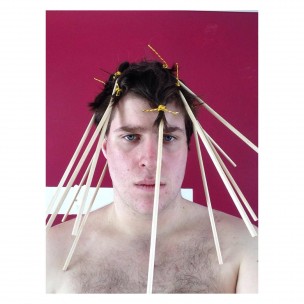
Printmaking plays a big role in Virgil Taylor ’15’s life. He works as a teaching assistant for Printmaking 2, and he is double majoring in studio art with a concentration in printmaking (naturally) and American Studies. His senior essay focuses on queer theory through his own experiences with roving hookup mobile apps such as Grindr, and he’s done research on the AIDS crisis and its surrounding activist art. As I found out when I interviewed Taylor in the printmaking studio of the CFA, Taylor also loves the ’80s, wades through a lot of snow, and spends most of the day sleeping.
The Argus: Would you describe yourself as a man about town?
Virgil Taylor: I’m a person about places. I’m physically large and loud, so people know who I am because I talk a lot. That’s pretty much it.
A: What are you involved in around campus?
VT: I do a lot of things. I used to be more involved with more things, but as I’ve gotten older I’ve started sleeping more. I’ve been involved with Hermes. I was on the board of WESU for two years. Hermes is a collective, so I did everything and nothing all at the same time. One thing that was really exciting about Hermes was when Antonin Scalia, the Supreme Court Justice, came to speak. We did a special issue about him. I photoshopped his head onto Botticelli’s “The Birth of Venus,” and he signed a copy of it. It’s in my possession now, but I’m giving it to the University archives when I graduate. We also wrote “stops more abortions than Scalia” and “practice safe sodomy” on condoms and threw them into the crowd after he spoke.
A: Would you classify that as a protest? What were you protesting?
VT: His political views, which are pro-capitalist and oppressive of minorities, of people of color, of sexual minorities, because of his literalist interpretation of the U.S. Constitution. I think that people think I’m more involved with activism than I am because I think that I try to take an active role in the political circumstance we find ourselves in at Wesleyan because I have an interest in standing up, in making alternative ways of seeing the world around ourselves. I got involved with USLAC after the snowpocalypse freshman year. There was a lot of activism around what the University expects from its contracted workers, like food and custodial services, who were expected to come in when they didn’t have power or safe roads to travel on. That was the first time I met with President Roth in one of the more adversarial meetings. I don’t want to overstate my role in the things I’ve been involved with. I just played a part in a horizontally organized group. I still try to play a part by trying to provide comfort and resources for people who are suffering.
A: Virgil, tell me about your new publication.
VT: Utopia? As you all read in Tuesday’s Argus, the Republican and Democratic student committees have set up a new magazine called Arcadia, and, as a queer person, I felt uncomfortable with the co-option of the concept of utopia by normative politics on this campus, so I’m starting my own magazine project called Utopia, as opposed to Arcadia, which is interested in anti-respectability politics and nonconformist identity complexes. I don’t know what it is! I just started it. But I would love input.
A: You were also involved with Hermes, and [also the zine] Hérmes.
VT: I guess recently I’ve been setting up a lot of magazines in opposition to other magazines. I think that trying to make something look respectable and conciliatory and normative, I think is an unhelpful project, so I think that things that lack a certain affection. I don’t know. I’m very contradictory because I like for things to look pretty and nice, but for the idea and content behind it to be going against the grain of respectability. I don’t like calling myself gay. I like calling myself a faggot.
A: So your activism has transitioned over the years from being about involvement in different groups to creating zines?
VT: I think that it’s what I’m best at: creating publications and communication. Rather than taking up too much space in forms I’m not as effective in, it’s productive for me to occasionally make little spaces and say little things that go out into the broader community. I take an aesthetic approach to much of my life. It’s why I’m an art major. I’m not the best planner of actions, but I do like making things that people can interact with and take in on their own time.
A: Would you say you combine art and activism?
VT: I’m interested in combining it.
A: Tell me about your studio art thesis.
VT: I just named it! It’s called “Irregular Quadrilateral,” so have fun spelling that.
A: I took basic geometry.
VT: It’s a printmaking thesis, and there will be some sculpture. Right now I’m excited and struggling a lot because I’m interested in making my thesis work particularly minimal in its aesthetic, and it’s challenging to spend so much time to do so little. I’m interested in a very reduced aesthetic—mainly geometric forms and marks. I also do some performance art, which was about gestures of social formation and identity formation based on repeated actions. I’m a geek. Sometimes I spend hours on Wikipedia pages about British royalty. Include that.
A: I shall. Tell me about your radio show.
VT: I’ve been involved with WESU for a while. I was on the board for two years, and now I host a radio show with Ethan Hill on the first, third, and fifth Sundays of each month at 10:30 p.m. It’s called David Whitney’s Favorite Songs, and you can listen to it on WESU’s website. Lots of great music, lots of terrible music, lots of music from the ’80s. I love the ’80s!


Leave a Reply